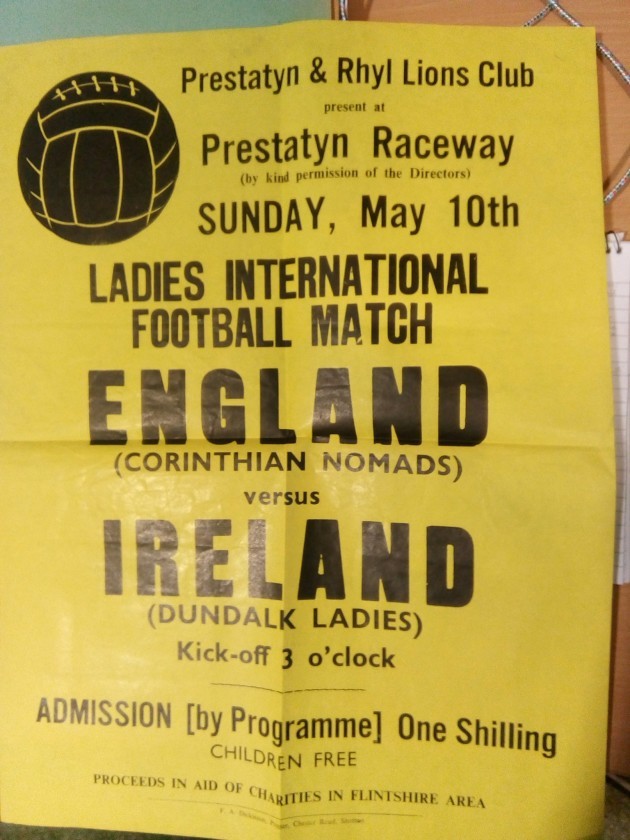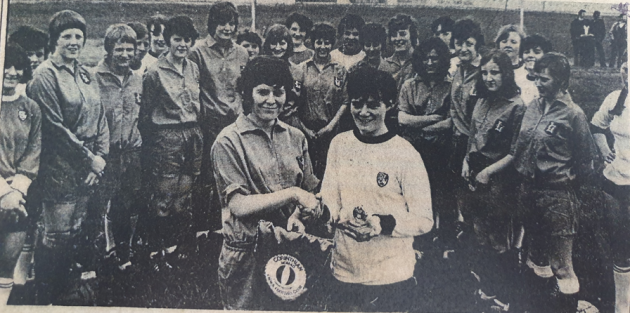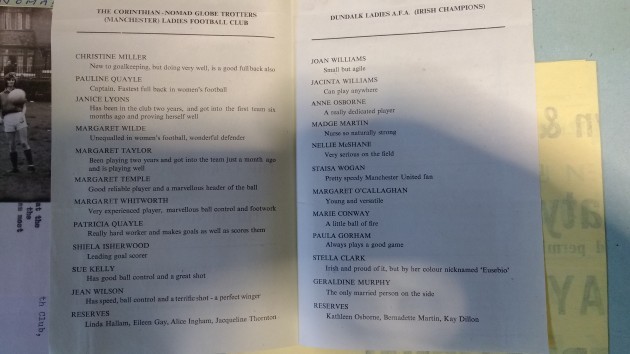IT’S 50 YEARS today since a seminal match took place in North Wales between Dundalk Ladies and the Manchester Corinthian Nomads.
Both teams were founding members of the Women’s Football Association — with Dundalk initially the only non-English team to join — which had been established in London in November 1969.
The game was the first Dundalk played against a WFA team and it occurred at a time when the idea of women’s football was treated with contempt by many of the game’s authorities.
Women at the time were banned from playing on FA-affiliated grounds, and so this clash took place at Prestatyn Raceway. The ban was implemented in 1921 and wasn’t lifted until 1971.
With no official international matches permitted during that era, this encounter — featuring two of the most accomplished sides in their respective countries — was the closest equivalent and advertised as ‘England v Ireland’.
A number of the Corinthians’ players had been planning a trip to Dublin this weekend to reunite with their former opponents, but sadly, the coronavirus pandemic has put paid to those plans for now.
Ultimately, it was a comfortable 7-1 win for the Corinthians in front of a reported attendance of around 4,000 people. Nonetheless, Dundalk were praised in the press for a spirited display and particularly, a spectacular long-range goal from Paula Gorham.
“We got hammered,” Gorham recalls. “But they were much more professional than us.
“They were far superior, but we had a lot of heart.
If I was 15 or 16 at the time. You look at the photographs now, some of us were like kids compared to them.
“They would have been definitely mid-20s and maybe some even older. They had a lot more experience behind them.”
Indeed, when you consider the history of the two sides, the outcome is no surprise. Dundalk had only recently been established as a team, featuring mostly players in their teens or early 20s, who had been taken from the Irish five-a-side indoor leagues and were still adapting to the 11-a-side game, having started playing this format in 1968.
The Corinthians, by contrast, had been established in 1949, and had toured the globe under the management Percy Ashley.
Dr Gary James, an expert on football in Manchester, writes of how: “50,000 watched them in a game at Benfica and then in 1960 the Corinthians ventured outside of Europe for a tour of South America. It was supposed to be a six-week tour but such was the popularity of the games that the women were asked to stay for three months.”
Yet despite being in illustrious company, it was Dundalk and Gorham who produced the moment of the match.
“I can’t remember it, but I was told that I scored from near the halfway,” Gorham says.
“Marie Bingham (née Conway), who was captain of the team, said she passed the ball out to me. I just looked up, saw the goalkeeper off the line, hit it up over her head.
“That was her memory of it, as vividly as if she played it yesterday.”
“Despite all the goals they scored, it was the best goal of the day, a brilliant goal,” Bingham adds.
“It was just over the halfway line when she took the ball. She was brilliant.”
She continues: “They were a tough team. You weren’t let away with the ball at all. If you got it, they were after you. You’d be taken down if they could get away with it.”
The comprehensive victory margin was nothing new for the Corinthians, who were accustomed to thrashing teams.
Margaret Shepherd (née Taylor) played centre-back for the Manchester side that day. With five Margarets in the team, she generally went by her nickname ‘Tiny,’ given to her in spite of the fact that she was one of the tallest players on the team.
“We played numerous matches,” she recalls. “Some we won 36-0, so 7-1 was pretty good for Dundalk, not being big-headed.
“Teams used to come up, saying ‘we’re the best in Yorkshire’ and then we’d trounce them 20-0. So we were one of the best teams [in the country].
“Sometimes it got that bad that we put the defence in the attack and the attack in the defence. So we certainly didn’t get the recognition that everyone in the team deserved. It’s only now that you think that. At the time, you weren’t bothered.”
Shepherd grew up playing a mixture of cricket, netball and football, before committing to the latter.
In the ’60s, when I started work, I got picked for the civil service netball team. When we were practising, the ball came along the floor. I kicked the ball and the other girl down the other end kicked it back. We were having a kicking session. She asked: ‘Do you play football?’ I said: ‘Girls don’t play football.’ She said: ‘Yes they do, I play for a team, why don’t you come along?’
“Luckily, she lived in the next town to me. She arranged one Sunday to meet on the bus. We went out of Manchester to Pog Lane [in South Yorkshire], and that’s how it all started.
“When we went [to get] football boots, you’d say ‘I play hockey,’ or ‘they’re for my brother’ or something, because girls just didn’t buy football boots.”
Shepherd remembers how, at one stage, the Corinthians were due to tour South Africa, along with the Chelsea men’s team.
“We’d had all our injections and then at the last minute, it was cancelled, because of apartheid and what have you. There was unrest in some of the places we were going to play football.”
The fact that it was Dundalk, rather than a team from Dublin, that took part in seminal game befits the area’s rich soccer tradition.
“It wasn’t a scenery town, but there’s an awful lot of industries and factories in Dundalk,” says Bingham. “Every factory and shop, you name it, all the factories had football teams.”
The company behind a local factory that produced Black Thorn football boots were ultimately responsible for setting up the Dundalk Ladies team.
Five-a-side women’s football was already popular in the area as part of the Maytime Festival.
“There’d be thousands at these games,” says Gorham, who took part in the event as a youngster. “When it came near the finals, the venue would be sold out, they’d have to erect a screen at the square in Dundalk where people could watch it outside.
“The Black Thorn ladies and men won it one year. It was a massive thing in the town. There was a big dinner dance held at the factory for it. My career really took off from there. I started to play for Dundalk.
“And we definitely were the champions at that stage. We were the curtain raisers before the men’s game. If the men were playing Waterford, we’d play the Waterford ladies. If they were playing Waterford in Waterford, we’d travel on the train and play them.
“That’s how we got the money to go to Prestatyn. We used to collect for money with buckets at half-time in the men’s match. After playing, we’d go up to the stands to collect the money to finance us to go on that trip. That was our first trip out of Ireland.
“Whatever money we had, we’d give it to the football club, and it [also] went towards the floodlights in Oriel Park. So we had to finance our whole way through.
“I was only at school, so don’t ask me how I did it. And I came from a family of 11 — my mother and father definitely wouldn’t have had money. But they were great days.”
For many of the Dundalk players, simply lining out for a football team was an act of defiance.
“My mum wouldn’t let me play it,” explains Bingham. “When she’d come out, I wouldn’t tell her that I was playing football with the boys.
“When I went to work in the factory at 14, both Black Thorn teams started, that’s how it went from [indoor to outdoor football] and we all started up to play.
I didn’t even think about [the critics]. I just went out on the field and off we went. The girls who played Gaelic had a lot of trouble, because we were told they couldn’t play the Gaelic or camogie anymore if they played soccer. They got a lot of hassle with the county board.”
Gorham adds that crowd abuse was not out of the ordinary, but nothing would stop her fulfilling this passion.
“People say it, I was just a natural. I remember they used to shout out: ‘Pity she’s not playing for the men’s team.’ Or even more vulgar: ‘Turn her upside down, make sure she’s a woman.’
“But I lived for training and football. We used to have to cycle miles for training. Even for that Dundalk team, we used to have to thumb it to Ardee for training and we hadn’t a clue how we were getting home. There were a load of sacrifices made, but then when you love the game, it doesn’t feel like a sacrifice.”
Gorham, who also competed in badminton, tennis, athletics, squash and represented Louth in GAA, was still in secondary school when she travelled to face the Corinthians and later worked for Clarks shoes manufacturer, while also winning 11 caps for the Irish team.
“They were very supportive, they let me off for all the international games. They were very good, as it was a great advertisement for them. They thought it was great seeing one of their employees on the Irish panel.”
However, the significant contribution to Irish women’s football made by Gorham and others has only recently begun to be truly recognised, and it took a moment of good fortune to start it all off.
How all this came up was one of the girls on the Dundalk team at the time was cleaning her bedroom. She moved the wardrobe and this yellow sheet fell from the top of the wardrobe. It was the poster for the Corinthian Nomads-Dundalk Ladies game.
“When she looked at it, she realised it was coming up to the 50th year. She contacted John Delaney and the FAI. He didn’t ring her back. No one contacted her. So she got in contact with another girl. From there it all developed. Meetings twice and three times a week, we had to organise to get to Dublin to meet the president. We had a day up there with him in Tallaght Stadium and also in Oriel Park.
“So a poster falling from the top of a wardrobe has blown into something unbelievable.”
While Bingham married, had a child and stopped playing not long after that momentous 1970 game, Gorham continued playing until the late ’80s, when she had her second child and opted to take up squash instead, though she did ultimately later return to football in a coaching capacity, overseeing a local girls team.
“We played all over Ireland and won the Ladies Division A Leinster title, which was never achieved in Dundalk before,” she says of her playing career.
“When the Dundalk Ladies disbanded, I went on and joined Drogheda Ladies, and I went from there and joined Dublin.”
Six years ago, around the time of her 60th birthday, Gorham received some long overdue recognition from the Football Association of Ireland, when she was sent an official international cap to represent the 11 times she lined out for her country, which included a memorable hat-trick on her debut amid a 3-2 away win over Wales.
“That [cap] was through sheer hard work by my daughter, she fought tooth and nail to get it.”
Her Irish team-mates included Margaret O’Connell, Linda Gorman, and the legendary Anne O’Brien, who would ultimately become a star of women’s football in Italy.
“I actually got an opportunity to play professional in France, but my father wouldn’t allow it,” Gorham says. “I was too young, I was still in school, so he wouldn’t hear of me leaving.
“Financially, I wouldn’t have been backed. We had a big family, so he wouldn’t hear of it anyway.
“I didn’t mind though, I’ve no regrets over it. And I was a Daddy’s girl anyway, maybe he just didn’t want me going.”
The legendary Manchester Corinthian ladies football team some 50 years on pic.twitter.com/dTLBLbq5Yf
— Margaret Shepherd (@MargeShep1) December 8, 2018
Gorham adds that there are two individuals who deserve as much credit as anyone for the early prominence of the Dundalk Ladies team — Kevin Gaynor and his wife Nan — who never got the proper acclaim they deserved during their lifetime.
“He really pushed ladies football to the forefront. Anything we’ve achieved in Dundalk was definitely because of Kevin Gaynor.
“The other managers were great, but Kevin actually got us on the map and his wife Nan – she was his rock. She looked after us and mothered us. When we went away, I don’t know where the money came from, but they’d always have something for us.
“We were probably young and gullible. We didn’t acknowledge the work Kevin and Nan were doing. She was there at every match, looking after the finances.
“There’s actually a trophy named after Kevin — the Gaynor Cup — for young girls starting out in football.
“But he wasn’t acknowledged [previously], even in our own town, for all the work he did for ladies football.
“When we were given medals for the 50th anniversary in Oriel Park, there was a medal [extra] and we had a meeting about it and I said: ‘It should go to Kevin Gaynor’s nephew.’ That’s what we did. We took the medal home, found out where Kevin’s nephew lived, we went and said: ‘This is in honour of Kevin and all he did for ladies football.’ But that was too late, Kevin was gone.”
While it has been slow to happen, the contribution of players like Gorham and figures such as Gaynor is gradually being acknowledged more widely with the passing of time.
“In our day, we weren’t recognised at all,” she explains. “Anything we achieved, it was through hard work and financing ourselves.”
On the other hand, Shepherd believes the English FA have not done enough to recognise the contribution of the trailblazing Manchester Corinthians team.
“I do envy [the modern players]. But when we played football and practised, it was a shack that we got changed in. No lighting, no water, and in winter, if you wanted to wash the mud off you, you had to break the ice on the duck pond to rinse yourself off. You used to go home on the bus absolutely covered in the mud. But you never were bothered. Playing football was all we wanted to do.
We went to Manchester City Ladies [recently] — they invited us as special guests. Just to see all that’s laid on for them is absolutely incredible. Good luck to them. We never got paid anything. In fact, we used to pay our own money to get from A to B. But we just played for the love of football.”
She continues: “I don’t think we have had the recognition. I’d like the FA and the women’s football teams of today to recognise just what we did to promote it. Because let’s face it, we’re all in our 70s now, there might be a few in the late 60s. We’ve even got Alice [Ingham], the oldest player, who’s 86. But they’re not going to be around for long.
“I would love to talk to the [current] players. I’d love to say: ‘Look, what you’ve got, this is what we did.’ We did it for the love of football, like you’re playing football now.
“The FA have a lot to answer for. It was very naive of them to say that women couldn’t play football. That really irks me. We should have had the recognition and we should have been invited to the top tournaments to say: ‘Thank you for being the pioneers of women’s football.’”




